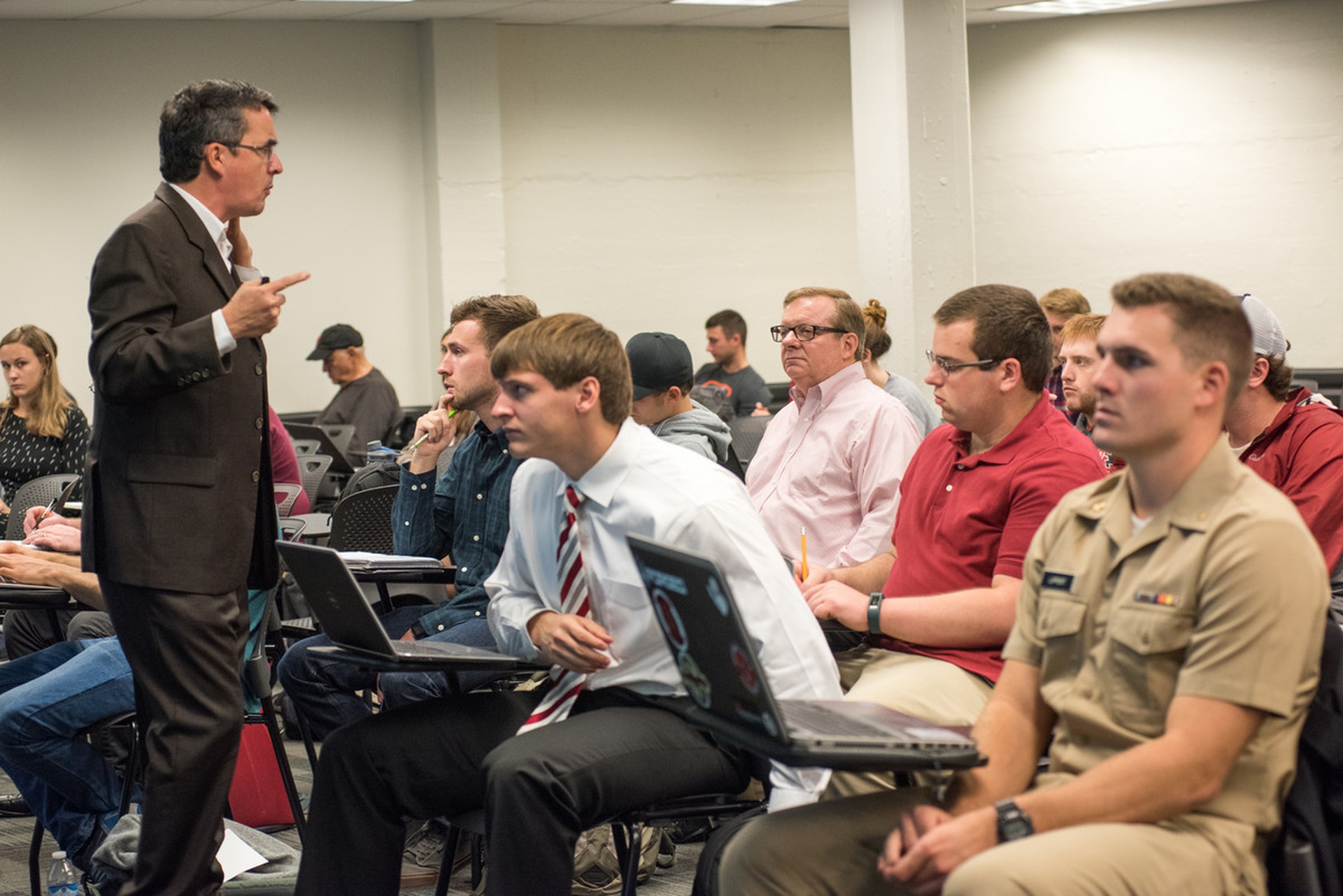A touch of gray in college classrooms
COLUMBUS, Ohio – Last fall, 66-year-old Mark Bainbridge found himself taking a graduate-level course in military history, the only student in the class who was not working on a Ph.D., and assigned to read a new book each week.
You might think that Bainbridge woke up in a cold sweat, having one of those nightmares where you’re back in school, taking an exam that you didn’t prepare for.
But it was no nightmare. Not only was it real, but he was enjoying every minute of it.
“I loved it,” Bainbridge said. “Just to hear the professor and students discussing the issues in the books we were reading was fabulous for me.”
Bainbridge took the class as part of Program 60, which allows Ohio residents age 60 and older to take Ohio State University classes tuition-free on a non-credit, non-degree basis. In most cases, all they need to do is sign up for Program 60 and get permission from the instructor of each class they want to take.
This semester, Program 60 had 336 students enrolled in courses at Ohio State and 792 registered participants.
 |
| Mark Bainbridge |
Students like Bainbridge don’t just get enjoyment from Program 60. A study by researchers in Ohio State’s College of Social Work found that participants received a variety of benefits.
The researchers surveyed 107 Program 60 students, whose age ranged up 89 years old. Participants in the study reported that, along with enjoying taking classes with younger students, the classes also helped increase their emotional satisfaction.
“What Program 60 provides older adults is not only an opportunity for learning, but an opportunity for building relationships and emotional satisfaction in life,” said Holly Dabelko-Schoeny, professor of social work at Ohio State and co-author of the research.
The study, published last year in The International Journal of Aging and Human Development, was led by Jee Hoon Park, a social work graduate student who was passionate about life-long education and learning. Park died unexpectedly before the study was complete, and Dabelko-Schoeny and social work graduate student KyongWeon Lee finished the study in his honor.
If there is anything that unites people who take Program 60 classes, it is a life-long interest in learning.
Geoffrey Stern, 74, retired in June after more than 49 years as a lawyer, disciplinary counsel of the Supreme Court of Ohio, and most recently as a partner in a Columbus law firm. Just a few months later, he signed up for four classes this semester through Program 60.
 |
| Geoffrey Stern |
Why so many classes?
“I have that many interests,” Stern said with a laugh. He is taking classes on the history of art, medieval history, women in cinema and astronomy.
One thing that Stern is not doing is taking the exams or writing the papers assigned in class. Neither is Bainbridge. That is one advantage Program 60 students have over traditional students.
“When I took the bar exam in 1968, I vowed to never take another test,” Stern said. “I’m keeping the pledge.”
But that doesn’t mean that students aren’t interested in learning the material in their classes. The social work study found that 86 percent of Program 60 students were motivated to participate in order to develop their knowledge.
Bainbridge said he enjoys reading military history books himself, but gets much more out of them when he reads them as part of a university course.
“You get the advantage of the professor’s knowledge and the discussion in class,” he said. “I really want to read these books just to understand the discussion that goes on when we meet in class.”
What Program 60 participants get from taking classes goes beyond the usual advice for older people to keep their mind active.
“They are able to pursue areas of interest from a huge catalog of classes at Ohio State,” Dabelko-Schoeny said.
“It is not just exercising your brain with crossword puzzles or Sudoku. It is about growth and development as a person.”
Both Stern and Bainbridge talked about how much they enjoyed interacting not only with their instructors, but especially with the younger students in their classes.
“What I found from the get-go was how nice the younger students were,” Stern said.
Dabelko-Schoeny said this inter-generational interaction is a key part of what makes Program 60 successful. In fact, the study found that Program 60 participants thought the program contributed more to expanding their social network with younger generations than with other older participants in the program.
“We tend to silo our generations. We have retirement communities and facilities for older people,” she said.
“But what Program 60 does is provide a unique opportunity for cross-generational relationship building.”
And it is not only the older students who benefit. Bainbridge, who is a CPA and retired Ernst & Young partner, has taken several MBA courses. When younger students find out what he did for a living, they seek him out after class, asking for advice about finding jobs and improving their resume.
Both Bainbridge and Stern said they would recommend Program 60 for other older adults. Their experience, as well as the social work study, show the value it can have.
“Program 60 counters some of our societal stereotypes about how we stop learning and growing and developing intellectually and socially as we get older,” Dabelko-Schoeny said.


